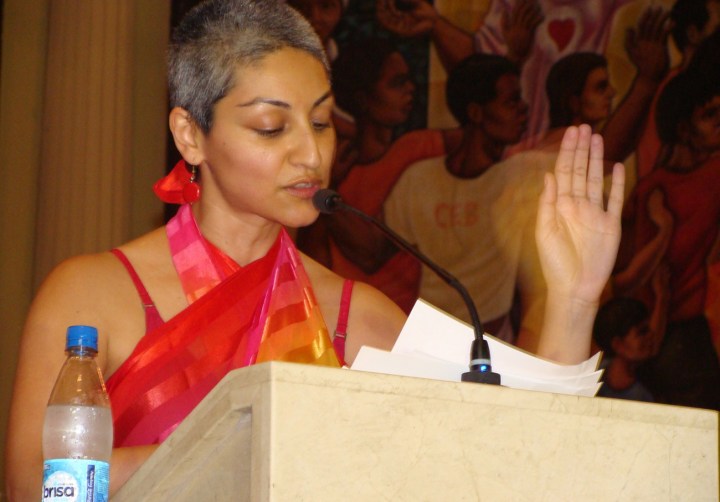Africa
Shailja Patel: Truth, Justice and Poetry

In town for the Poetry Africa tour, Shailja Patel talks to GREG NICOLSON about Kenya’s post-election violence, the International Criminal Court trials, truth, justice and being a “brown Kenyan”.
Oh God of all creation
Bless this our land and nation
Justice be our shield and defender
“Shocked and sickened” in 2007-08, Kenyan poet and activist Shailja Patel turned to her national anthem to find her own resilience. “What happened specifically is we had the most successful election in Kenya’s independent history. We had over eight million people turning out to vote, a huge youth segment […] People got up at 4am, walked two hours to the polls, stood in lines for six to eight hours in the sun so they could vote,” says Patel, who now divides her time between Berkeley and Nairobi. “It became clear that the tallies being announced were different from those that had actually been recorded in the constituencies and when observers began to stand up and protest that false results were being announced, there was a sudden power blackout at the conference centre. A couple of moments later the General Services Unit, the government’s paramilitary unit, marched in. They ejected all the media, except Kenya Broadcasting Corporation, which is the government mouthpiece, and 15 minutes later we saw the head of the electoral commission announce that the new president was Mwai Kibaki, the incumbent, who had clearly been losing until then,” she told iMaverick.
“So many of us had been working and dreaming of this for decades. It was like, ‘This is finally going to happen’ – we were finally going to see a change of government, a shift of power form the small group of greedy old men who had controlled the country for 50 years and we saw that happening with the popular vote.” But after Kibaki was declared president, violent attacks and recriminations waved across the country, leaving 1,133 people dead and over 650,000 displaced. “We had a church that was set on fire in the Rift Valley. Over 200 people had taken refuge in this church and it was burned down, and that was unthinkable,” says Patel, who expressed her own grief through poetry. “That’s where I really saw the best of my generation of Kenyans […] People were able to joke. We were able to laugh and find ways not to break down.”
Patel was a founding member of Kenyan’s for Peace, Truth and Justice, and has been a vocal supporter of the ICC’s decision to investigate the organisers of the attacks. “This is the first time in Kenya’s history that we have seen members of the ruling elite, members of the political class, stand in court and have to justify and defend themselves,” says Patel, never dropping eye contact. “This really brings together ethnicity, land, dynastic politics, state impunity, and police violence and this is the point at which the cycle of impunity can be broken. If we see convictions resulting from these trials then for the first time the whole country gets the message that it doesn’t matter how powerful you are, it doesn’t matter who your family is, you will be answerable for crimes committed against the people of Kenya, and it will hopefully prevent a recurrence. Next year we have elections again.”
But how can a poet promote justice and prevent a repeat of the violence? “First, by telling the truth. I think that’s the first job of a poet. To tell the truth and to tell it with as much beauty and as much clarity and power as possible so that it enters the listener through the heart and through the gut,” she said. “I think of my job as a poet as being to first wake myself up and take the responsibility to learn the truth, which means often doing hard work, looking beyond the headline stories, being willing to interrogate data and structure and systems, and then to create the conditions where other people can wake up to those truths […] It’s not necessarily going to feel good, but I’ve never considered my job as an artist to be to entertain or to make people feel good. I believe when we do open ourselves up to really feeling both joy and grief, rage and pain, as well as just wonder at the beauty and the exquisiteness of life, we emerge larger. We emerge more human. We emerge more porous and more aware of our connection to everything and that does make us braver and that does give us hope, no matter how dire things are.”
Patel’s quest for truth began by asking questions as a child, one of which regards her identity. “I define myself as a brown Kenyan. Indians are natives and citizens of a country called India, which I had never been to until this year,” she says. “I have had a very strong sense of being an outsider, growing up as a minority in Kenya. But the more I learn about Kenya, about other African countries, the more I realise that that sense of ‘outsiderhood’ is not specific to just my community,” she says. “My work comes from always wanting to make space for voices that have been silenced, for people that have been invisible, whether it’s women, marginalised communities, migrants.” DM















 Become an Insider
Become an Insider